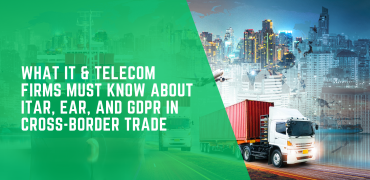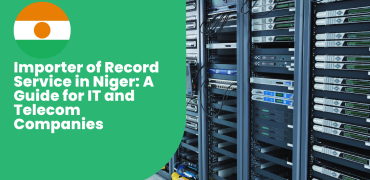Introduction
The modern tech startup landscape is hypercompetitive, fast-moving, and global by default. For startups in the IT and Telecom sectors, international expansion isn’t just a long-term vision—it’s a strategic imperative for survival and scale. However, this global ambition is often hampered by complex regulatory requirements, customs compliance challenges, and import/export restrictions. That’s where Importer of Record (IOR) services come into play.
ASL IOR simplifies and secures the global movement of IT and Telecom hardware by acting as a trusted IOR partner across more than 200 countries. In this article, we explore why fast-growing startups need IOR services to expand internationally—faster, safer, and more compliantly.
1. The Scaling Dilemma for Startups
From Local MVP to Global Rollout
Most tech startups begin with a Minimum Viable Product (MVP) aimed at a local or regional market. As product-market fit is validated, the natural progression is to enter new markets—whether it’s launching a new data center in Dubai, setting up a support office in Germany, or deploying network equipment in Singapore.
But international scaling isn’t plug-and-play.
Startups quickly find themselves dealing with:
-
Import license requirements
-
Local tax laws and VAT
-
Product certification and labeling
-
Customs clearance and duties
-
Restricted goods and dual-use compliance
These barriers delay rollouts, increase operational costs, and—if mismanaged—can cause severe legal and financial damage.
2. What Is an Importer of Record (IOR)?
An Importer of Record (IOR) is a third party authorized to import goods into a country on behalf of another business. The IOR assumes legal responsibility for:
-
Customs declarations
-
Paying all applicable duties and taxes
-
Ensuring compliance with local regulations
-
Providing import documentation
-
Representing the importer in case of audits or inspections
For startups, especially those with no legal entity or office in the target country, an IOR service provider like ASL IOR becomes essential.
3. Why Startups Can’t Afford to Ignore IOR Services
A. Startups Often Lack Global Legal Entities
Startups expanding into new markets may not have a registered business entity in every country they wish to operate in. Without a legal entity, importing IT and Telecom equipment becomes nearly impossible.
ASL IOR acts as the legal importer in each country, eliminating the need to set up a branch office just to deploy hardware.
B. Customs Compliance Is a Legal Minefield
Each country has its own complex import regulations. Mistakes in documentation, incorrect product classification (HS codes), or undervaluation of goods can result in:
-
Customs seizures
-
Heavy penalties
-
Shipment delays
-
Reputational damage
An experienced IOR partner ensures that every import meets the destination country’s legal requirements—mitigating the compliance risk from day one.
C. Speed and Agility Are Crucial
Time is the most valuable currency for startups. Delays in deployment mean delayed revenue. Building an internal compliance team or handling customs processes yourself can cause critical slowdowns.
ASL IOR offers a plug-and-play model where startups can ship equipment globally and focus on core operations—while the IOR handles everything else.
4. Use Cases: How IOR Services Empower Startup Growth
1. Global Data Center Deployment
A fast-growing SaaS company needs to expand its infrastructure to support global users. They source servers and networking equipment from the U.S. but need to deploy in multiple locations—Europe, Asia, and the Middle East.
Instead of dealing with the customs and licensing requirements of each country, they rely on ASL IOR to:
-
Handle end-to-end import logistics
-
Ensure all certifications and duties are compliant
-
Provide full visibility into cross-border movement
2. IoT Startup Scaling into Emerging Markets
An IoT startup launches a pilot in Africa but lacks a local presence. Importing their specialized devices requires local certifications and customs clearances.
ASL IOR acts as the IOR in those countries, secures the required documentation, and gets the devices cleared and delivered—without the startup needing to navigate local bureaucracy.
5. Benefits of Using IOR for Startups
✔️ Regulatory Compliance
IOR providers stay up-to-date with the latest regulatory changes, import restrictions, and compliance updates. ASL IOR ensures your hardware always clears customs without risk.
✔️ Faster Go-to-Market
By removing the need to register entities, apply for licenses, or build in-house compliance expertise, startups can launch in new markets in weeks instead of months.
✔️ Cost Efficiency
Delays, fines, and rejected shipments can eat into your budget. An IOR reduces these hidden costs and gives predictable import fees—crucial for financial planning.
✔️ Global Reach, Local Expertise
With operations in over 200+ countries, ASL IOR combines global capabilities with local compliance know-how, providing a truly borderless expansion solution.
6. The IOR Lifecycle: What Startups Can Expect
Here’s how the Importer of Record process works with ASL IOR:
| Step | Description |
|---|---|
| 1. Pre-Shipment Consultation | Determine product classification, licensing needs, and country-specific regulations |
| 2. Documentation & Compliance | ASL prepares all customs documents and compliance certificates |
| 3. Import Coordination | ASL acts as the IOR and oversees the import process in the destination country |
| 4. Customs Clearance | The goods are legally imported, duties and taxes are paid, and cleared from customs |
| 5. Final Delivery | Hardware is delivered to the end location, ready for deployment |
7. Countries Where Startups Especially Need IOR Support
Some countries are especially difficult to navigate without IOR support due to restrictive import laws or complex compliance frameworks:
-
Saudi Arabia – Requires local entity or authorized representative
-
Brazil – High duties, documentation strictness
-
India – Bureaucratic delays, product certifications
-
China – Tight regulations and IP sensitivity
-
African markets – Infrastructure challenges, local regulations
ASL IOR provides tailored support in each of these high-complexity markets, ensuring startups don’t lose momentum due to regulatory friction.
8. IOR vs. Other Models: Why It’s Ideal for Startups
| Model | Description | Ideal For |
|---|---|---|
| Direct Import (own entity) | Requires local registration, tax filing, licenses | Large enterprises with local teams |
| Distributor Import | Third-party resells the product | Low-margin, loss of control |
| Courier/Postal Import | For small shipments only, high risk | Sample/demo units |
| Importer of Record (IOR) | End-to-end compliant import via third party | Startups & fast-moving companies |
IOR provides control + compliance + speed—the perfect fit for fast-growing, resource-conscious startups.
9. Why Choose ASL IOR?
ASL isn’t just a logistics partner—it’s a strategic enabler for your global growth journey.
What sets us apart:
-
✅ Experience with IT & Telecom hardware
-
✅ Coverage in over 200 countries
-
✅ Dedicated compliance and documentation team
-
✅ Transparent pricing with no hidden fees
-
✅ Support for full hardware lifecycle: sourcing, import, deployment, and disposal
Whether you’re scaling to your first international market or rolling out equipment in ten countries simultaneously, ASL IOR ensures a smooth, compliant, and cost-effective process.
Conclusion: Don’t Let Borders Limit Your Growth
Scaling a startup is already hard—don’t let international borders make it harder.
From ensuring customs compliance and import licenses to facilitating fast delivery of IT and Telecom infrastructure, ASL IOR takes the heavy lifting out of global expansion. Partner with a trusted IOR provider and take your startup global—without the red tape.




